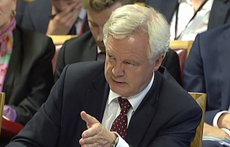If you don’t think a left-wing Brexit is a good idea, take a look at the EU’s latest rising star
Two out of every three parliaments in the European Union are classed as 'conservative' – there is no way to reform a movement that is dominated by right-wingers

Before the EU referendum, many admitted that the EU is not perfect, but continued by saying that the only way to change it is from the inside.
I would invite these same individuals to study Ryszard Legutko, a Polish philosopher and political theorist. In 2014, he called LGBT rights “a tyranny of the minority”, and last week he wrote a piece warmly welcoming Donald Trump to Poland as a much needed “dissenter”. That same week, he was elected unopposed to co-chair the third largest European Parliamentary group, the European Conservatives and Reformists.
Last year I was purveyor of Lexit, and it didn’t go down too favourably within leftist and liberal circles. It seemed like a betrayal to many – why should progressives, especially in the current climate, consider voting leave?
It’s now been just over a year since then – and I don’t regret a word. As expected, David Cameron was forced out of No.10, and a snap election cut the Conservative’s mandate into a minority government. However, domestic turmoil will always be temporary, and certainly by itself did not justify Brexit. What did at the time, however, and what still does, is the personnel within the EU27.
As I noted last year, out of 28 EU Governments, 19 were considered “conservative”. Excluding the UK, that is two out of every three parliaments leaning right – something many leftists fail to consider. The EU Parliament, for the most part, represents the domestic parliaments of respective nations around Europe – and thus, social democrats and the far left are little more than a voice in the back, a protest movement within a larger tank of social conservatives and austerity pushers.
This of course, puts out any flame of the “remain and reform” argument – a pseudo anti-democracy, like the European Union has proven to be, will choose its path and rather than adopting a more federal approach, will subject its members to the concurring ideology. This has, for several years now, been privatisation and cuts – or to use the more technical term, moderate austerity. In 2010, Angela Merkel declared, “Nobody in Europe will be abandoned. Nobody in Europe will be excluded. Europe only succeeds if we work together”. As Greece found out, inclusion comes at a heavy and punitive price.
With political polarisation gripping the globe, more and more parliaments across Europe are turning right – those on the other side are often subject to “punching left” by so-called liberals. Many called the last few elections within Europe a validation of centrism, a validation of the EU itself; but these same individuals forget how close we were to a France with Marine Le Pen, an Austria with Hofer, a Dutch Parliament led by Geert van Wilders.
Within the EU, liberalism will continue to take a political battering – and with it, the central ideology of the EU will either be forced to shift, or break down completely.
Indeed, if we turn back to the idea of reform, some may argue that the European Parliament can help to limit the impact of Theresa May and her austerity agenda. Economically, as I have already alluded to, it’s quite the opposite. The European Institute notes that, “EU member states may not have a budget deficit that exceeds three per cent of their Gross Domestic Product (GDP) or a national debt that exceeds of sixty per cent of the GDP.”
Between Brussels and Downing Street, the notion of “living within our means” is a philosophy contemptuously shared.
Surely, however, our counterparts in the liberal European Union undercut Westminster on social issues? This is quite far from the truth – with the most diverse parliament in UK history, it’s the EU that needs to catch up with Britain. While the 8 June saw a record 51 non-white MPs elected – alongside a record 45 LGBTQ+ members, the most in any parliament worldwide – a significant portion of Europe was whipping up far right sentiment.
While I am in no ways a fan of the Conservative Party or their history, May’s Government seems like the hippie movement of the 60s against their adversaries in Brussels. The refugee crisis has ostensibly given social conservatives a platform to call for tight borders – just look at Hungarian Prime Minister, Viktor Orban, who described the flow of migrants as “a poison”.
However – and this, perhaps, is the crux of it – it’s not just the far right who oppose British values. Whether it be centrists like Macron, who just yesterday appeared to forget colonial history when calling Africa’s problems “civilisational”, or even Angela Merkel, famous purveyor of open borders, who has taken a newfound tough status on migrants. She also voted against the legalisation of same sex marriage just two weeks ago.
In any sense, the Brexit vote appears to be vindicated by not only the current standings of much of the European Parliament, but also the lack of scope for reform. For progressives – economic or social – it would be best, perhaps, to distance ourselves from such an organisation.


Join our commenting forum
Join thought-provoking conversations, follow other Independent readers and see their replies